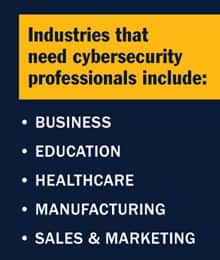What is a Cybersecurity Degree?

Know before you read
At SNHU, we want to make sure you have the information you need to make decisions about your education and your future—no matter where you choose to go to school. That's why our informational articles may reference careers for which we do not offer academic programs, along with salary data for those careers. Cited projections do not guarantee actual salary or job growth.
The field of cybersecurity is about leveraging top-notch problem-solving skills with a technical aptitude to keep people and data safe.

Compared to degrees in the liberal arts or nursing, earning a degree for a career in cybersecurity is relatively new. While cybersecurity professionals have been working in the field for at least three decades, the term “cybersecurity” was not coined until more recently, according to Jonathan Kamyck, a senior associate dean at Southern New Hampshire University (SNHU).
Kamyck is experienced in the field, including his work as an information systems security manager (ISSM) and as a consultant for IT and cybersecurity. He also played a key role in shaping cybersecurity education at SNHU, leading the development of the university's first competency-driven undergraduate cybersecurity program.
Earning a cybersecurity degree at any level — associate, bachelor’s or master’s — can position you for a rewarding career maintaining data privacy, conducting risk assessments, designing strategic plans for security systems and much more.
First Things First: What is Cybersecurity?
In simplest terms, cybersecurity “includes protecting people, property and other assets from unauthorized access or modification,” Kamyck said. The field of cybersecurity is diverse. It’s important to note that cybersecurity is a professional field and not necessarily a job title.

Terry Winn, a cybersecurity adjunct at SNHU, defines cybersecurity as protecting information, systems and networks from attacks or threats. Winn has been immersed in the field since 2009 and has experience as an information system security professional team lead.
According to Winn, the C-I-A triad is the cornerstone of cybersecurity. The C-I-A, in this case, stands for confidentiality, integrity and availability. "Organizations need to ensure that their data/information is safe from unauthorized access (confidentiality), unauthorized modifications (integrity) and that data is accessible when needed (availability)," he said.
Your work in the field of cybersecurity may include:
- Assessment of risk
- Secure network and infrastructure design
- Secure program and tool development
- Training employees in cybersecurity awareness
A good cybersecurity professional ensures that their organization “runs smoothly by verifying that everything is functioning as expected," said Kamyck. As a cybersecurity professional, he said you may also search for anomalies, investigate incidents and help organizations and individuals recover from disasters.
Is Cybersecurity a Good Career?
Every area of cybersecurity has the potential to be the focus of a rewarding career.
"Cybersecurity is a great career choice for students interested in technology who want to make a difference," Winn said. What’s great is the ability to choose the areas of cybersecurity that are meaningful to you throughout your career.
With a degree in cybersecurity, one type of role to look for is an information security analyst, sometimes known as a cybersecurity analyst. The career outlook for this field is bright. According to the U.S. Bureau of Labor Statistics (BLS), the 10-year outlook for careers in this field is expected to grow by 29% from 2024 to 2034.* That is much faster than the national average of 3% for all occupations, according to BLS data.*
The median salary for jobs in information security analysis was $124,910 in 2024, BLS reported.*
The versatility is one of the reasons for such great potential in this field. “Cybersecurity touches every industry and business, so the positions, responsibilities and titles vary greatly,” Kamyck said.
While you certainly get out of any degree area what you put into it, there are some real perks within the field of cybersecurity. According to Kamyck, “A key aspect of this field is working to protect others, whether it’s the people you care about, the general public, the assets of businesses or the ability to do the things we want and need to do."
Remember, not all superheroes wear capes. Some work quietly in the background, ensuring threats are identified and neutralized before end users and the general public even know about it.
What Can You Do With a Degree in Cybersecurity?
There is no one type of job that a professional in this field may hold. A cybersecurity degree is a qualification for a career in information security. Because of the profession's diverse skill set and focus, there's also an opportunity to select a path that interests you, according to Kamyck.
Cybersecurity specialists may work as:
- Information Security Analysts: In this role, you will need to stay up to date on the latest methods that hackers may use to launch cyberattacks on your organization. Research is a key component of this role, as is staying current with disaster recovery best practices. You may also recommend updates and enhancements to your organization’s overall data security.
- Cybersecurity Operations Managers: This role allows you to serve as a business stakeholder in an organization, conducting security analyses, threat analyses, investigations and continuous assessments to identify, fix and ultimately prevent cyberattacks or data breaches.
- Chief Information Officers: This executive role combines team management with information security systems skills and understanding. You may oversee teams tasked with providing employees with technical support and training, and you will likely play an important role in strategic planning for your organization. You could make decisions for implementing and supporting customer service platforms, and you might also ensure that all technological processes align with organizational needs and goals.
If you want to study cybersecurity to help fight crime, you’re in luck. Several career paths could allow you to aid law enforcement and the private sector.
Often, forensic crimes are uncovered within a business or organization and turned over to local authorities for prosecution. “Working on a (cyber)security team may provide the opportunity to uncover crime if it exists,” Kamyck said.
While cybersecurity professionals may not work directly as members of law enforcement, they can often use their skills to aid in solving cybercrimes and resolving peace and security in the lives of others.

What Skills Do You Need to Work in Cybersecurity?
Even in a highly technical career field like cybersecurity, strong communication skills are crucial, as are critical thinking skills, according to Winn. "Because each situation is seemingly different, the ability to think critically really shines through," he said.
When deciding if a degree in cybersecurity is right for you, you'll want to consider both technical and non-technical skills.
According to Kamyck, common non-technical skills — sometimes known as soft skills — needed for a successful career in cybersecurity are:
- A positive attitude because people skills are always important.
- Ability to reason and solve problems, given that the world of cybersecurity involves constant analysis, the ability to think critically and reason effectively is important.
- Aptitude for documenting attempted and successful solutions, as you must be able to convince others of the need for training or technology when they may not understand the threat you’re predicting.
- Collaboration, because working in teams is a given for most professions, and cybersecurity is no exception. This field involves a lot of problem-solving, which is most successful when done as a team effort.
- Strong communication skills, both written and oral, because you’ll need to write and deliver reports to gain the funding necessary to maintain and update technology. You’ll also need the ability to train end-users to use the technology they need to do their jobs responsibly.
Technical skills can vary by position but typically include:
- Analyzing network traffic and logs to identify potential threats, which requires an analytical way of thinking and understanding data.
- Applying cybersecurity principles to problems, systems, networks and facilities, which involves staying up to date on developments in the field.
- Assessing technical components, because technology is always changing, and you need to stay on top of the latest developments.
- Determining requirements to solve problems and evaluate options, which involves applying critical thinking skills to your technological knowledge.
If learning or honing these skills sounds like a good fit for you, a degree in cybersecurity may be just the right next step. You may have an opportunity to gain experiential learning along the way, too. At SNHU, for instance, you can participate in the National Cyber League (NCL) and put the skills you're developing to the test. In a recent competition of colleges and universities across the country, SNHU ranked 4th nationally.
Certifications help prove your skills and advance your expertise in specific areas of the field to make you more competitive in the job market, and there are many options available to cybersecurity professionals. Which ones you choose depends heavily on the focus of your job.
“While not mandatory for most positions, certifications provide students with an additional credential to validate their skills and understanding of cybersecurity topics,” Kamyck said.
In fact, paths to certification are built into cybersecurity degree programs at SNHU. “When appropriate, courses use certification materials to allow for meeting course objectives” while also helping degree candidates prepare for a certification exam, said Kamyck.
You might talk to your instructors in every class and ask which certifications they recommend.

What Education is Needed for Cybersecurity?
Just as there is no one-size-fits-all job for cybersecurity professionals, there is no one right cybersecurity degree.
You can find cybersecurity programs at the associate, bachelor's and master's levels. “Each degree has a different level of depth and subject matter,” Kamyck said. “(They) highlight general concepts as well as ... focus on some of the most popular topics in cybersecurity."
Each cybersecurity program offers students different stages of cybersecurity training and preparation, and every college or university may have its own focus for the degree.
Some of the skills and concepts covered within the degrees at SNHU are:
 Associate Degree in Cybersecurity
Associate Degree in Cybersecurity
An associate degree in cybersecurity, Winn said, could lay the foundational building blocks for understanding the cybersecurity field. Some things you can do in a cybersecurity associate degree program include:
- Apply security principles and practices to all components of a system.
- Learn to design, implement and evaluate computer-based solutions as well as the computing requirements needed to solve complex problems.
- Understand how to communicate technical information effectively to a range of audiences.
 Bachelor’s Degree in Cybersecurity
Bachelor’s Degree in Cybersecurity

According to Winn, the undergraduate degree balances general education with core cybersecurity courses. In a cybersecurity bachelor's degree program, you can learn how to:
- Apply security principles to various systems, as well as analyze and evaluate those systems to determine risks or threats.
- Develop and hone communication skills, as well as learn to make judgments in computing practice based on legal and ethical principles.
- Gain professional skills, such as establishing and meeting goals, project planning and risk management.
- Identify and define computing requirements needed to solve problems.
To Remus Figueroa Orozco ‘23, who graduated with a bachelor's in cybersecurity from SNHU, studying cybersecurity was totally worth it. "It was the best choice I’ve made," he said.
By his commencement ceremony, he was looking for a new role and said he had back-to-back job interviews lined up.
"As long as you push yourself, you can accomplish anything,” he said.
What Kind of Jobs Can You Get With a Bachelor’s in Cybersecurity?

Cybersecurity professionals are needed in virtually every career field, every business and every type of organization.
According to Kamyck, some industries that need cybersecurity professionals include:
- Business: Consider that virtually every business (or nonprofit organization) needs computers to run efficiently. Those computers have users in need of technological support, data that needs to be stored and software that needs to run efficiently. All organizations also have detailed financial information that must be protected. Cybersecurity personnel are the ones to protect and maintain this information daily.
- Education: Online education is here to stay, and with it comes the need to protect student data. There are strict laws ensuring that student privacy is maintained. Having a strong cybersecurity team is essential to schools at every level, from grade school through post-secondary, whether an online program or an in-person school.
- Healthcare: With the use of electronic records and the importance of patient privacy, the need for vigilance with cybersecurity is vital. Hospitals, doctor’s offices and every medical facility that manages patient care and stores patient data needs ongoing information security efforts to protect patient privacy and safety.
- Manufacturing: Companies that rely on assembly lines or other technology to make or ship goods also rely on their computer networks. Protecting business processes, ensuring customer data privacy and protecting software used in manufacturing goods are essential to running most business operations.
- Sales and marketing: Any good marketing strategy requires a list of sales leads and customer contact information, often including credit cards or other financial information. Customers rely on businesses to protect this data, and a good cybersecurity professional is the person to do it.
“Just because the job may not have ‘cybersecurity' in the title doesn’t mean it doesn’t include key cybersecurity elements,” Kamyck said. If cybersecurity skills appeal to you, consider what type of industry interests you as well. You will likely be able to make a match.
 Master’s Degree in Cybersecurity
Master’s Degree in Cybersecurity

A master's in cybersecurity can help you further hone the craft and even become an expert, Winn said. Some things you can learn in a cybersecurity master's program include:
- Develop risk management and disaster recovery plans.
- Evaluate and respond to cyber threats and defend against common cyber attacks.
- Further develop communication and collaboration skills.
- Hone leadership skills, write information security policies and recognize and evaluate industry standards.
Prince Gelito '24G earned his master's in cybersecurity from SNHU while serving in the United States Army Reserves. Why? "To make our world safe from cybercriminals," he said.
According to Gelito, the digital forensics course was especially beneficial, and what he learned immediately helped him in his day-to-day work.
Explore Your Options
Within the different degree levels, you may also have the opportunity to specialize in a particular area important to some cybersecurity roles, including data analytics, project management and IT management. At the undergraduate level, you may also be able to put your electives toward a relevant minor.
If you're not sure you're ready to enroll in a degree program, you might consider earning an online cybersecurity certificate first. Over six courses, which can be completed within six months to a year, you could gain the foundations needed to access entry-level jobs in the field.
Should you later decide to take your education further, you can transfer the credits you earn within SNHU's certificate directly into one of their undergraduate cybersecurity degree programs. That puts you 18 credits ahead right from the start.
Find Your Program
What Degree is Best for Cybersecurity?
The cybersecurity degree program that's best for you depends on your current education level and your professional goals. As you search for the right college or university to attend, consider accreditation and designation. Both can speak volumes about the institution's commitment to education and the program's potential.
For instance, SNHU is accredited by the New England Commission of Higher Education (NECHE). This means the university meets a certain quality standard and has the resources needed for student success.
SNHU has been designated a National Center of Academic Excellence in Cyber Defense (CAE-CD) by the National Security Agency (NSA). The Bachelor of Science (BS) in Cybersecurity is SNHU's validated program of study.

"The CAE-CD designation is the federal government’s way of recognizing academic institutions that meet its strict criteria for excellence in cybersecurity education," Kamyck said.
Earning such a designation is a rigorous process — one that directly benefits the institution and the students enrolled in the validated program of study. Students can tap into scholarships and grants available through the Department of Defense Cyber Scholarship Program and the CyberCorps®, and program graduates can indicate to employers that they've graduated from a validated program of study at a National Security Agency-designated CAE-CD institution, according to Kamyck.
If you'd like to pursue or advance a career in the government or military, finding a CAE-designated institution could be especially favorable because the NSA's National Center of Academic Excellence in Cybersecurity (NCAE-C) program is partnered with prominent organizations such as the Federal Bureau of Investigation (FBI) and the Cybersecurity and Infrastructure Security Agency (CISA).
Learn more about how to get into cybersecurity.
Can You Change Your Career to Cybersecurity?
One of the best aspects of cybersecurity is that the skills needed to be strong in this profession often overlap with key skills in other areas. So, if you're thinking about changing careers to cybersecurity, you may be pleasantly surprised by how much of your skill set can transfer over.
Communication skills, the ability to collaborate effectively, employing a systems-thinking mindset and the ability to apply sound judgment in solving problems are all skills that transfer well from other fields into cybersecurity.
If you work in business, education, healthcare or law enforcement, you likely have these skill sets already. No matter your background, Kamyck said, your “previous work experience can aid in providing context and understanding to working in cybersecurity.”
For example, someone feeling “burned out” from the physical aspects of their job in healthcare may enjoy applying their insight and understanding of legal compliance in the healthcare field to an information systems role.
“The same goes for those who have worked in the military, law enforcement, political science, law, psychology or sociology, and the list goes on and on,” Kamyck said. “Even if the student worked in a more artistic capacity, such as an artist, musician, philosopher, journalist or teacher, their ability to see problems differently can aid in their construction of solutions."
And if you already have a bachelor's degree in a different subject, you may choose to position yourself for a job in your new field with a cybersecurity-specific master's degree, or perhaps a cybersecurity certificate, to help you develop relevant skills. A cybersecurity credential can also help you better market yourself in the job search.
Ready to Take the Next Step?
If you enjoy keeping up with technological changes, researching trends and assessing a business’s potential for risk, a degree in cybersecurity could take you to the next level in your career. “All past education and work experience aid in problem-solving, gaining perspective of a situation and eliminating potential solutions in favor of the best solutions for the situation,” Kamyck said.
Whatever your past, cybersecurity could well be your future.
*Cited job growth projections may not reflect local and/or short-term economic or job conditions and do not guarantee actual job growth. Actual salaries and/or earning potential may be the result of a combination of factors including, but not limited to: years of experience, industry of employment, geographic location, and worker skill.
A former higher education administrator, Dr. Marie Morganelli is a career educator and writer. She has taught and tutored composition, literature, and writing at all levels from middle school through graduate school. With two graduate degrees in English language and literature, her focus — whether teaching or writing — is in helping to raise the voices of others through the power of storytelling. Connect with her on LinkedIn.
Explore more content like this article

How to Get Into AI: What AI at Work Looks Like for Beginners

Understanding AI Ethics: Issues, Principles and Practices

What is the Best Degree for an Artificial Intelligence Career?
About Southern New Hampshire University

SNHU is a nonprofit, accredited university with a mission to make high-quality education more accessible and affordable for everyone.
Founded in 1932, and online since 1995, we’ve helped countless students reach their goals with flexible, career-focused programs. Our 300-acre campus in Manchester, NH is home to over 3,000 students, and we serve over 135,000 students online. Visit our about SNHU page to learn more about our mission, accreditations, leadership team, national recognitions and awards.


